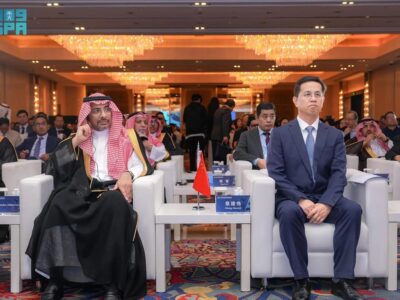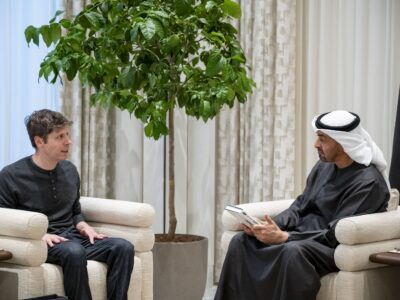Muammar Gaddafi’s government
said it was declaring a unilateral ceasefire in its offensive to
crush Libya’s revolt, as Western warplanes prepared to attack
his forces.
But government troops pounded the rebel-held western city of
Misrata on Friday, killing at least 25 people including
children, a doctor there told Reuters. Residents said there was
no sign of a ceasefire.
And in the rebel-controlled east, the government declaration
was dismissed as a ruse or a sign Gaddafi was desperate.
“We have to be very cautious. He is now starting to be
afraid, but on the ground the threat has not changed,” a French
spokesman said. Britain, like France a strong advocate of armed
action, said it would judge Gaddafi by “actions, not his words”.
Turkey, an opponent of military action, said the ceasefire
should go into effect immediately.
“We decided on an immediate ceasefire and on an immediate
stop to all military operations,” Libyan Foreign Minister Moussa
Koussa told reporters in Tripoli on Friday, after the UN
Security Council passed a resolution authorising military
action.
He called for dialogue with all sides. Gaddafi had vowed to
show “no mercy, no pity” on Thursday, and rebels pleaded for
foreign aid before time ran out.
The ceasefire offer was probably prompted by Gaddafi’s
realisation that air strikes could seriously degrade the Libyan
military, said John Drake, senior risk consultant at AKE.
“The Gaddafi regime may be willing to negotiate,” he told
Reuters. “With talk of strikes against military convoys he may
be concerned about a significant attack on his military.”
Western officials said military action could include France,
Britain, the United States and one or more Arab countries.
“Britain will deploy Tornadoes and Typhoons as well as
air-to-air refuelling and surveillance aircraft,” Prime Minister
David Cameron told parliament.
“Preparations to deploy these aircraft have already started
and in the coming hours they will move to airbases from where
they can start to take the necessary action.”
Gulf state Qatar said it would take part but it was unclear
whether that meant military help, while Italy said it would make
military bases, equipment and troops available.
Denmark and Canada said they planned to contribute
warplanes. France is to host talks on Saturday to discuss the
action with British, Arab League and other leaders.
People in Misrata said the rebel-held western city was under
heavy bombardment by Gaddafi’s forces on Friday.
“They are bombing everything, houses, mosques and even
ambulances,” Gemal, a rebel spokesman, told Reuters by phone
from the last big rebel stronghold in the west.
Another rebel named Saadoun said: “We believe they want to
enter the city at any cost before the international community
starts implementing the UN resolution.
“We call on the international community to do something
before it’s too late. They must act now.”
A fighter named Mohammed said tanks were advancing on the
city centre. “All the people of Misrata are desperately trying
to defend the city,” he said.
Al Arabiya also said the rebel-held western town of Zintan
was attacked by rockets on Friday. The fighting reports could
not be independently confirmed. Authorities were preventing
Tripoli-based foreign journalists from reporting freely.
In rebel-controlled Tobruk in the east, there was scorn for
the ceasefire call. On Thursday, Gaddafi had vowed “no mercy and
no pity”.
“See how things change from night to day,” said Ashraf
Afgair. “They are just trying to calm international opinion.
It’s a desperate attempt by Gaddafi to cling to power.”
Idris Khamis said: “They have reached the end of the line.
That’s why they are accepting the U.N. decision. Otherwise it’s
the same fate for Gaddafi as Hitler and Mussolini.”
But Gaddafi’s troops did not fulfil his threat to overrun
the rebel base of Benghazi overnight after their rapid
counter-offensive brought them to within 100 km (60 miles) of
the eastern city.
The UN Security Council passed a resolution endorsing a
no-fly zone and “all necessary measures” to protect civilians
from Gaddafi’s forces.
Libya’s military airfields are mostly strung along the
Mediterranean coast, as are its population centres. Gaddafi’s
ground troops are advancing from the west along the main coast
road towards Benghazi in the east.
While other countries or NATO may play roles in military
action, U.S. officials expect the United States with its
extensive air and sea forces to do the heavy lifting in a
campaign likely to include air strikes on tanks and artillery.
Ten of the Council’s 15 member states voted in favour of the
resolution, while Russia, China and Germany were among five that
abstained. The resolution was co-sponsored by France, Britain,
Lebanon and the United States.
Apart from military action, it expands sanctions against
Gaddafi and associates. Among firms whose assets it orders
frozen are the Libyan National Oil Corp and the central bank.
Rebel National Council head Mustafa Abdel Jalil told Al
Jazeera television air strikes, beyond the no-fly zone, were
essential to stop Gaddafi.
Some in the Arab world sense a Gaddafi victory could turn
the tide against pro-democracy movements that have unseated
autocrats in Tunisia and Egypt and inspired mass protests in
Bahrain, Yemen and elsewhere.
Gaddafi’s Defence Ministry warned of swift retaliation, even
beyond Libyan frontiers, against hostile action.
“Any foreign military act against Libya will expose all air
and maritime traffic in the Mediterranean Sea to danger and
civilian and military (facilities) will become targets of
Libya’s counter-attack,” the ministry said in a statement.
Foreign military action could include no-fly and no-drive
zones, a maritime exclusion zone, jamming army communications
and intelligence help. Air strikes would almost certainly be
launched to knock out Libyan radar and air defences.
“Mission creep” worries some. Western powers, chastened by
protracted wars in Afghanistan and Iraq, would be wary of
getting drawn into any ground action in Libya.
Germany said it saw “considerable dangers and risks”. NATO
member Turkey also said it opposed the operation.
Arab League chief Amr Moussa said the UN resolution was
aimed at protecting civilians and not did not authorise
invasion, and said he did not want any side “to go too far”.
Gaddafi would be guilty of war crimes if he carries out a
threat to attack civilians in Benghazi, the International
Criminal Court’s prosecutor Luis Moreno-Ocampo said.








